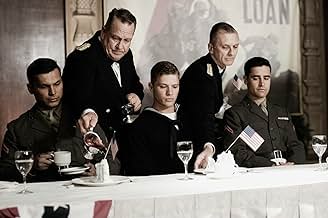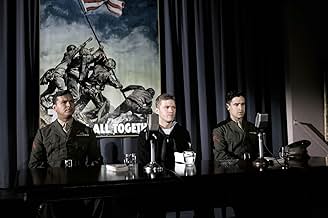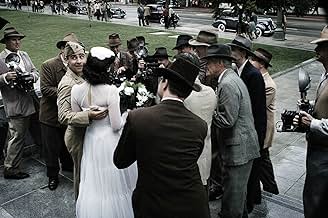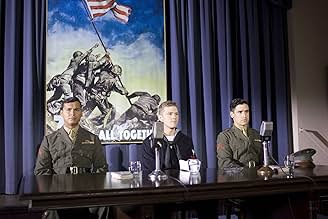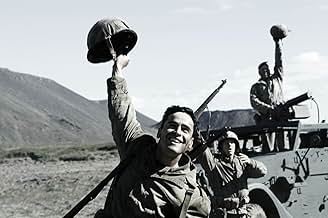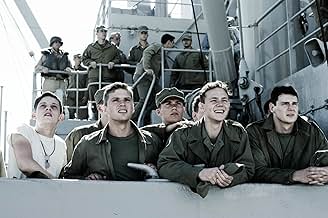Las historias de vida de los seis hombres que izaron la bandera en la batalla de Iwo Jima, un punto de inflexión en la Segunda Guerra Mundial.Las historias de vida de los seis hombres que izaron la bandera en la batalla de Iwo Jima, un punto de inflexión en la Segunda Guerra Mundial.Las historias de vida de los seis hombres que izaron la bandera en la batalla de Iwo Jima, un punto de inflexión en la Segunda Guerra Mundial.
- Dirección
- Guionistas
- Elenco
- Nominado a 2 premios Óscar
- 16 premios ganados y 28 nominaciones en total
Opiniones destacadas
The war sequences are skillfully executed. It reminds me of the early sequences of 'Saving Private Ryan' as its shot with washed out colours and the scenes are just as visceral and hard-hitting. They are extremely effective as are the scenes where the three survivors are being paraded by officers in order to sell military bonds. The real truth is ignored, the illusion of a photo is confirmed as truth, the three soldiers are burning in the inside while obliged to parade themselves and then they are left with nothing, just memories of the war. Eastwood has also briefly but effectively tackled the racism theme. Even the label of a hero was not enough for Hayes to get a drink at a bar.
Haggis's writing is solid. War isn't glorified and the aftereffects are shown with subtlety rather than blatant preaching. The editing is tight as the movie flows at a smooth pace. It starts off with the war sequences and then follows the three surviving flag-raisers revisiting the war in flashbacks. Eastwood's soundtrack is intense and gives voice to the unspoken words. All the performances are good but it is Jesse Bradford, Adam Beach and Ryan Phillipe who stand out as the three survivors, particularly Phillipe who is restrained.
'Flags of Our Fathers' an important side of the war that almost vanished into oblivion but thanks to Eastwood and his team, many people today will know about it.
For generations we have been sons of war, and our sons will be fathers of sons of war. Will it end? Perhaps not. Will there be stories like this one told in film or whatever media is next for all generations yet to come, just as there has been for all past? It's a very sad testament to the human condition, but I'll be paying my respect the next time I am in DC with a better understanding of the statue in question.
It is true that nations define themselves in large part through film and especially war films. It is true that solipsism reigns when matters of national honor are raised. This film pulls the legs from under such cheap theatrics while doing the very same thing. Its a characteristic of Eastwood that drives me crazy, how quick he is to polish ideals so they glisten next to the other guy's clichés, in this case Spielberg's "Private Ryan," which in retrospect was pretty bad storytelling.
So. Let's spank Clint for hypocrisy, for metaphorically taking the first flag. But I think much of the blame for that goes to Paul Haggis, a scourge now in full infection in Hollywood. He won't hesitate to use any device in the spine of his work, no matter how trite.
And let's wonder every time we see a war, even one like this.
But let's also give the man his due for storytelling. This is fantastic visual storytelling. Multiple narrators, multiple framing devices. Nonlinear presentation with time reversals motivated by flashbacks, memories, tales told. The business about walking 1300 miles to tell the truth, and the business about old men finally telling the truth to the son. Its what I call a folding device to underscore that we are seeing the truth, the story within the story.
The pacing is perfect, even a bit too manufactured for my taste. The most effective war film in terms of confusion and lack of theater is "Thin Red Line," I believe. The scale of the thing, both in the battles and bond events was impressive. The phrasing is tasteful, but when an episode finished, I couldn't help but be aware that I was being sold an image I was expected to wear.
Its enough to drive me to drink.
Ted's Evaluation -- 2 of 3: Has some interesting elements.
(My Comment) The film was based on the book written by Doc's son, James Bradley. It wasn't until his father's death that he found out that Doc was one of the Iwo Jima flag raisers. Soldiers with real combat experiences usually keep their war stories to themselves. Clint Eastwood directed the film, and he didn't pull any punches in the battle scenes, even though the battle for Iwo Jima was considered one of the bloodiest against the Japanese in the Pacific. The only problem I had with the movie was that Eastwood used too many flashbacks that jumped around and made the movie hard to follow. The movie would have been better if Eastwood had gone in chronicle order with some flashbacks. During the battle scenes, you actually see the chaos that soldiers encounter on the battlefield. Overall, I found the story to be realistic and very compelling by not glorifying war. It is a long movie, but the time passes very fast. This film will receive many Oscar nominations. Some of the movie is graphically violent and shows the dark side of war, and the effects war has on our returning soldiers. (Warner Brothers Pictures, Run time 2:12, Rated R) (8/10)
¿Sabías que…?
- TriviaThe story about the flag raising being posed was true. It was started, ironically, by Joe Rosenthal. He did not know he had taken the famous photograph until he returned to the States. He did, however, take a second photograph of the five Marines and one Navy Corpsman gathered around the flag. When people asked if he had posed the photograph, he, thinking they were referring to the second photograph said "Of course". It was only after seeing the first photograph that he realized they were referring to that photograph and not the second one.
- ErroresIn explaining the importance of a successful bond drive, the treasury representative says that the fuel dumps are empty and "our Arab friends only take bullion." At the time of World War II, America was essentially self sufficient in oil production and not dependent on Arab oil. While oil was discovered in some Arab countries before the war, it was not extensively developed until after the war.
- Citas
[last lines]
James Bradley: I finally came to the conclusion that he maybe he was right. Maybe there's no such thing as heroes. Maybe there are just people like my dad. I finally came to understand why they were so uncomfortable being called heroes. Heroes are something we create, something we need. It's a way for us to understand what's almost incomprehensible, how people could sacrifice so much for us, but for my dad and these men, the risks they took, the wounds they suffered, they did that for their buddies. They may have fought for their country but they died for their friends. For the man in front, for the man beside him, and if we wish to truly honor these men we should remember them the way they really were, the way my dad remembered them.
- Créditos curiososThere is an additional short sequence after the credits have ended.
- Bandas sonorasKnock Knock
Written and Performed by Kyle Eastwood, Michael Stevens, Andrew McCormack and Graeme Flowers
Selecciones populares
- How long is Flags of Our Fathers?Con tecnología de Alexa
- Is "Flags of Our Fathers" based on a book?
- How does "Flags of Our Fathers" relate to "Letters from Iwo Jima"?
- Where exactly is Iwo Jima?
Detalles
- Fecha de lanzamiento
- País de origen
- Sitios oficiales
- Idioma
- También se conoce como
- Flags of Our Fathers
- Locaciones de filmación
- Productoras
- Ver más créditos de la compañía en IMDbPro
Taquilla
- Presupuesto
- USD 90,000,000 (estimado)
- Total en EE. UU. y Canadá
- USD 33,602,376
- Fin de semana de estreno en EE. UU. y Canadá
- USD 10,245,190
- 22 oct 2006
- Total a nivel mundial
- USD 65,900,249
- Tiempo de ejecución2 horas 15 minutos
- Color
- Mezcla de sonido
- Relación de aspecto
- 2.39 : 1
Contribuir a esta página








